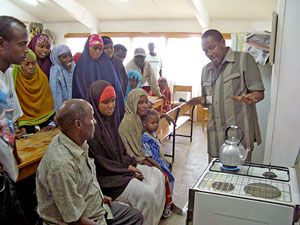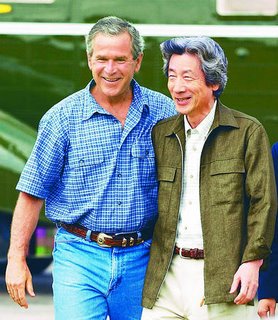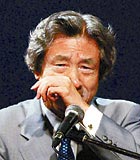 A New Computer-Generated Voice - Los Angeles Times
A New Computer-Generated Voice - Los Angeles TimesA New, Computer-Generated Voice
Chinese are increasingly demanding a freer flow of information, and analysts say the Internet will thwart government efforts to prevent it.
By Mark Magnier, Times Staff Writer
September 16, 2006
BEIJING — Hours after the government announced new regulations this week tightening Beijing's grip on foreign news agencies, Chinese Internet users went on a tirade.
"Dear officials," said one anonymous posting on NetEase, a popular Web portal. "Since modern technology is so advanced, why don't you invent some pills which people can take and lose their ability to think? Then you'll have nothing to worry about."
Similar outbursts have followed the release of rules aimed at tightening the state's hold on books, the Internet, magazines, karaoke, broadcasting, video games, satellite dishes, even children's cartoons.
With every passing year, Chinese are increasingly expecting freer information from varied sources and with less government spin, to the consternation of a Communist Party that has long been reliant on an information monopoly to bolster its political monopoly.
The growing appreciation among young Chinese for unfettered news — and their ability to convey their opinions rapidly across cyberspace — is a key reason why Beijing will ultimately lose the information war, analysts say, even if it wins some near-term battles.
"The fact that Chinese officials are trying harder and harder means they're actually having less and less control," said Xiao Qiang, director of the Berkeley China Internet Project at UC Berkeley's journalism school. "Between now and the Olympics, it will continue to weaken. They're fighting a losing game."
The European Union and the State Department weighed in against Beijing's new plan, which gives the state-run New China News Agency censorship authority and exclusive distribution rights over foreign wire service competitors such as Reuters and the Associated Press. Analysts say the change appears to be as much a New China News Agency profit grab as a state bid to control information.
Faced with growing criticism at home and abroad, the news agency on Wednesday defended the change on grounds of global fairness.
"The dissemination of financial information is mainly concentrated in the hands of a small group from developed countries, meaning it is hard for developing countries to have the right to distribute financial news or discuss market prices," it said, quoting its vice president, Lu Wei.
Although China has a long history of downplaying foreign criticism, ignoring the uproar from the cheap seats at home is more difficult.
In a random sampling of Internet comments shortly after the regulations were released Sunday, a few Chinese supported the government's stance as a way to stem "foreign rumors." But the vast majority slammed the new rules with sarcasm and wit, accusing the government of turning back the clock, undercutting the media's watchdog role and keeping its own people in the dark.
"Why not follow North Korea and begin a carpet ban on all information, and institute revolutionary education like in Mao's years?" said a posting by "Julien" on the popular Cat898 forum, one of several hundred Web comments on the issue that appeared early this week before the government halted further discussion. "Then I bet everyone would become a loyal citizen, convinced they were living in a harmonious paradise, with Stockholm syndrome."
The plethora of media-related edicts released by Beijing in the last 18 months reflects government frustration over the growing confidence of China's 100 million Internet users and their more global mind-set, analysts say. The latest salvo by officials, announced Wednesday, imposes strict controls on information released by the Chinese judicial system.
"Control is well beyond the power of any government. Neither America nor China can control" the Internet, said Li Xiguang, dean of the journalism school at Qinghua University and co-author of a 1996 book arguing that foreign media demonize China.
China is hardly sitting on its hands. Critics say the administration of President Hu Jintao and Premier Wen Jiabao has effectively used technology, high-profile arrests and the chill of self-censorship to limit the most obvious criticism and dissent.
"I have to say, it's very impressive how they work to control the Internet," said Lucie Morillon, Washington representative with Reporters Without Borders, a media rights group.
Increasingly, however, Beijing ends up looking silly and churlish in the process, some add. Last year, when the state-run China Youth Daily quietly enacted a reporter bonus system based on how much praise articles received from government officials, the editor of the newspaper's popular supplement Freezing Point posted a protest on the company's internal computer network.
Within hours, details of the plan were all over the Internet, prompting a red-faced Propaganda Department to scramble to purge all website references. The damage was done, however, and the agency was forced to drop its plan.
And when Freezing Point was closed this year, ostensibly for printing an article on Chinese history that challenged party orthodoxy, dozens of scholars signed petitions in support of Editor Li Datong, who promptly filed a legal challenge over the publication's threatened closure.
Li was ultimately replaced by a more compliant editor, but he was not imprisoned, as many had expected, and continues to speak his mind in interviews with the foreign media.
Still, three years into its expected 10-year term, the Wen-Hu leadership team appears more convinced than ever that liberalism offers few dividends and enormous potential liabilities, analysts say.
"They continue to use brutality, fear and intimidation," said Wu Guoguang, a former editorial writer for the People's Daily and now a political science professor at the University of Victoria in Canada. "They try and show a big smile and invite people to come to China and make money. But in the area of the media, they remain intent on not relaxing their control."
Media analysts predict little letup in Beijing's vigilance over the next two years, given a series of high-profile events on the horizon, although they say they remain convinced that the government is ultimately fighting a rear-guard action.
Next month, Beijing hosts a key Communist Party plenary meeting, followed in the fall of 2007 by the 17th Party Congress and in August 2008 by the Summer Olympics.
"I don't expect China to loosen up any time soon," said Xiao of UC Berkeley. "But their controls are also having less and less effect."
--------------------------------------------------------------------------------
mark.magnier@latimes.com








